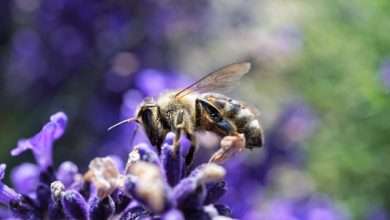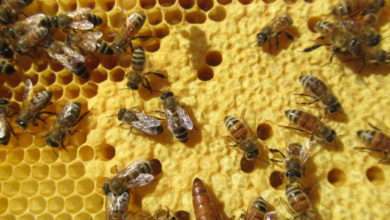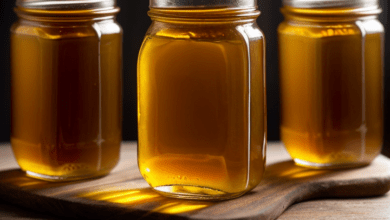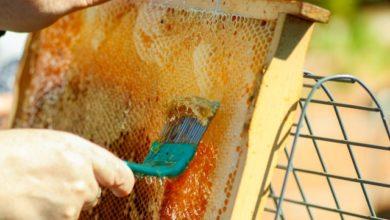Why You Should Avoid Feeding Honey to an Infant: Essential Safety Precautions

The debate of whether or not honey should be fed to babies has been going on since the dawn of time. Honey has been known to be a good source of nutrition, for its antibacterial properties that make it a natural remedy, and for its sweet flavor that most people enjoy.
However, there are a few essential safety precautions that come with feeding an infant honey, which must be taken into consideration.
In this article, we’ll discuss why it’s important to avoid feeding honey to infants and provide an overview of the potential risks associated with it. So, if you’re planning on making honey part of your little one’s diet, it’s imperative to read this post and pay close attention to the information listed here.
What Makes Honey Unsafe for Babies Under 12 Months?
First of all, it is important to understand that honey is not safe for babies under 12 months of age. This is due to the presence of a specific type of bacteria known as botulism spores, which can be found in contaminated honey.
It is possible for these spores to cause serious harm to your baby if ingested, which is why it’s essential to follow the advice and strictly follow the guidelines concerning honey and infants.
When an infant consumes honey, the botulism spores can multiple and produce a toxin that can lead to severe health complications, including paralysis and even death in some cases.
It’s important to note that there are different types of botulism spores, so you should carefully examine the honey before giving it to your baby.
The Vulnerability of Infant Digestive Systems
Now, we will explore the vulnerability of infant digestive systems and the potential risks associated with the consumption of honey.
Immature Digestive System and its Impact on Honey Digestion
During infancy, a baby’s digestive system is still in its early stages of development. This means that it may not possess the full capability to process certain foods effectively. Honey, in particular, poses certain challenges for infants due to its natural composition.
Honey is a complex food that contains various sugars, including fructose and glucose. Infants have an underdeveloped ability to break down these sugars, which can lead to difficulties in digestion. The immature digestive system of a baby lacks certain enzymes that are necessary to effectively process honey.
Lack of Enzymes to Process Honey Effectively
Enzymes play a crucial role in the digestion process by breaking down specific substances into simpler forms for absorption. Unfortunately, infants lack a specific enzyme known as glucose-6-phosphate dehydrogenase (G6PD) that aids in processing honey.
Without this enzyme, the digestion of honey becomes challenging for infants, leading to potential complications. The presence of certain compounds in honey, such as organic acids and pollen, can further exacerbate the difficulties in breaking down honey in the infant digestive tract.
Risks of Stomach Irritation and Allergic Reactions to Honey
The immaturity of a baby’s digestive system, combined with the lack of necessary enzymes, can increase the risk of stomach irritation when honey is consumed. Honey has a low pH level, which means it is acidic in nature. This acidity may cause discomfort and irritate the delicate lining of the infant’s stomach.
Moreover, infants are at a higher risk of developing allergies or experiencing allergic reactions compared to older children and adults. Honey, being a natural product, contains various allergens, including pollen and other proteins. These allergens can trigger allergic reactions in susceptible infants, leading to symptoms such as hives, itching, swelling, or even difficulty breathing.
Considering these potential risks, it is recommended to refrain from giving honey to infants under the age of one. The American Academy of Pediatrics and the World Health Organization advise against the introduction of honey into an infant’s diet until they reach their first birthday.
Infant Botulism: Understanding the Link with Honey and Recognizing its Symptoms
As new parents, ensuring the health and well-being of our precious little ones is of utmost importance. However, there are certain hidden dangers lurking in unexpected places, such as honey, that can pose serious risks to our infants.
Here is some information on infant botulism, shed light on its link with honey, and provide comprehensive information on recognizing its symptoms. By understanding these crucial facets, we can take proactive measures to protect our infants and promote their safe growth and development.
The Connection between Infant Botulism and Honey:
- Infant botulism is a relatively rare but potentially life-threatening illness that affects infants aged six months or younger.
- The primary cause behind infant botulism is the bacterium Clostridium botulinum, which produces toxins harmful to infants but generally harmless to adults.
- Honey, a beloved natural sweetener, has been identified as a significant source of infant botulism due to its occasional contamination with the bacterium.
- Infant botulism cases linked to honey have been reported worldwide, emphasizing the critical need to raise awareness about its potential risks.
Recognizing Symptoms of Infant Botulism:
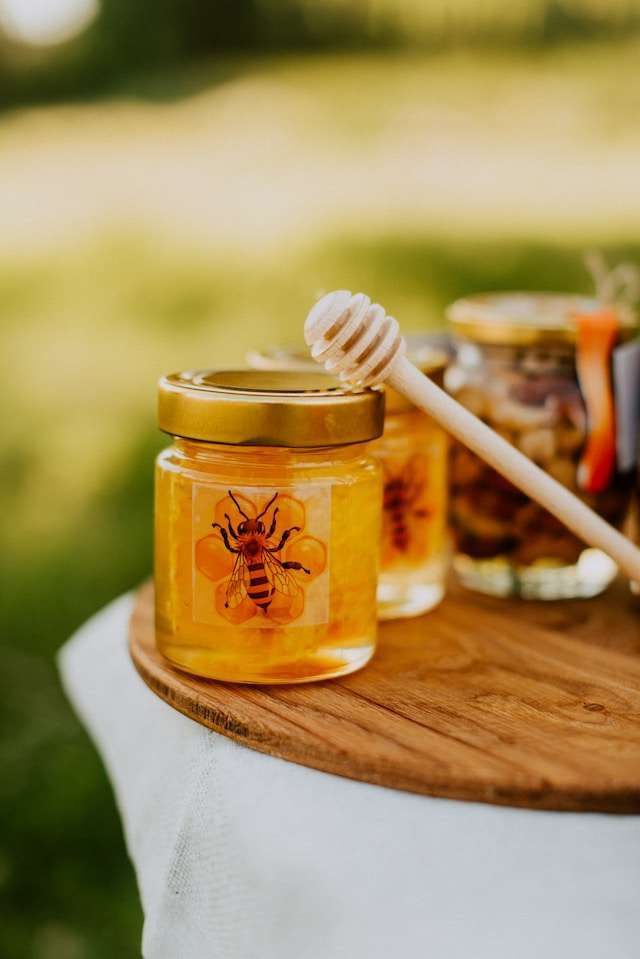
- Constipation: One of the earliest signs of infant botulism is constipation. Infants affected by the illness may experience difficulty passing regular bowel movements, leading to infrequent stools or hard stools.
- Weakness and Floppiness: Infants suffering from botulism may display generalized weakness and floppiness. They may feel excessively lethargic, have a lack of muscle tone, and struggle to maintain head control.
- Difficulty Feeding: Botulism can impact an infant’s ability to feed properly. Affected infants may exhibit poor sucking or feeding reflexes, resulting in weak or insufficient intake of milk or formula.
- Impaired Breathing: As the illness progresses, infants may present respiratory difficulties. Shallow breathing, weak cries, and episodes of breath-holding or gasping for breath are common symptoms observed in affected infants.
- Facial Weakness: Infant botulism can manifest as facial weakness, with affected infants displaying a lack of facial expression and drooping eyelids. Their overall facial movements may appear subdued or unresponsive.
- Gastrointestinal Issues: In some instances, infants may experience gastrointestinal problems linked to botulism. Symptoms can include nausea, vomiting, a decreased appetite, and generalized irritability.
What to Consider Before Feeding Your Baby Honey?
When it comes to feeding your baby honey, there are a few things that should be taken into serious consideration.
1. The Source
First, you should make sure that the honey you plan on giving your baby is sourced from a trusted seller. The best honey is organic and unpasteurized, as pasteurization can significantly reduce beneficial nutrients from the honey. Be sure to purchase honey that is from a credible source, trusted brand, or beekeeper.
2. The Age
The second consideration is that honey should not be fed to babies under the age of one year. While honey is beneficial for adults, its health benefits are not applicable to young children. In addition, the risk of botulism spores is far higher in wider population groups, such as babies below the age of one year.
3. The Allergies
Finally, it is important to check for potential allergies before feeding your baby honey. Some babies may have an allergic reaction to honey, so make sure to speak to your pediatrician in order to identify, or rule out, any red flags.
What Are the Alternatives to Honey for Babies Under 12 Months?
If you are looking for alternatives to honey for your baby, there are a few viable options that are safer and more nutritious.
1. Breast Milk or Formula
First, both breast milk and formula are considered to be the most important foods during infancy and should ideally make up the majority of your baby’s nutrition. As such, if you’re looking for alternatives to honey for your baby, you should consider offering either breast milk or formula as their main source of nourishment.
2. Fruits and Vegetables
Fruits and vegetables are also a great alternative to honey and can provide your baby with essential nutrients such as fiber, vitamins, and minerals. Furthermore, they are low in calories, which can help keep your baby’s weight under control.
3. Rice Cereal
Rice cereal is also an excellent alternative to honey and is known to be highly nutritious. Not only is it low in cholesterol and sugar, but it’s also rich in iron, which is essential for optimal growth and development.
Conclusion
While honey is a great source of nutrition for adults, it is not recommended for babies under one year of age. This is due to the presence of botulism spores, which can cause serious health complications for infants. Therefore, it is important to make sure that you consulted with your doctor first before giving honey to your baby.
Additionally, alternative options such as breast milk, formula, fruits and vegetables, and rice cereal are great alternatives to honey and can provide your baby with the nutrition they need for optimal growth.
FAQ’s
Why is it important to avoid feeding honey to an infant?
- Feeding honey to infants can pose a serious health risk. Honey may contain bacteria called Clostridium botulinum spores, which can be harmful to infants under one year old. Their underdeveloped digestive systems cannot effectively eliminate these spores, potentially leading to infant botulism, a rare but serious illness.
What is infant botulism?
- Infant botulism is a rare but serious illness caused by the bacterial spores found in honey. Once ingested, these spores can release toxins in an infant’s intestines, leading to symptoms such as constipation, weakened muscles, difficulty sucking or swallowing, and overall weakness. This condition requires immediate medical attention.
At what age is it safe to introduce honey to a child?
- It is generally recommended to wait until the age of one before introducing honey to a child’s diet. By this age, most infants have developed a stronger immune system and digestive capacity, reducing the risk of infant botulism. However, it’s always best to consult with a pediatrician regarding the appropriate time to introduce honey to your child.
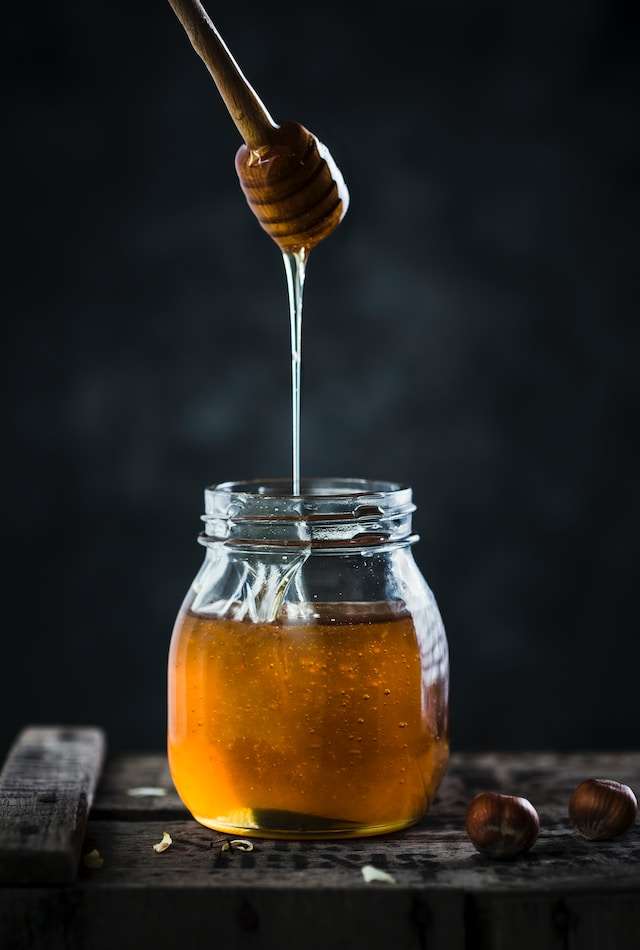
Can I use honey as an ingredient in homemade baby food?
- No, it is crucial to avoid using honey as an ingredient in homemade baby food, regardless of cooking or processing methods. The spores in honey can resist heat or other treatments, making them still potentially harmful to infants. Choose alternative sweeteners or natural fruit purees to sweeten homemade baby food recipes.
Are there any alternatives to honey for sweetening infant food?
- Yes, there are many safe alternatives to honey for sweetening infant food. You can use mashed ripe fruits, such as bananas or apples, to add natural sweetness to pureed baby food. Additionally, unsweetened applesauce or a few drops of natural maple syrup can be used in moderation as alternatives.
Is it safe to buy commercially prepared baby food containing honey?
- Commercially prepared baby food undergoes strict quality control measures, and reputable manufacturers adhere to safety guidelines. While such products might contain honey in trace amounts, the risk of infant botulism is minimal. However, always review ingredients and consult with a pediatrician if you have concerns.
Can breastfeeding mothers consume honey?
- Breastfeeding mothers can generally consume honey without any adverse effects on their infants. The spores present in honey do not pass into breast milk in sufficient quantities to pose a risk. However, it is important for breastfeeding mothers to maintain a balanced and healthy diet overall.
Do all types of honey pose a risk to infants?
- Yes, all types of honey, including raw and pasteurized, can potentially contain the bacterial spores associated with infant botulism. It’s crucial to avoid feeding honey to infants until they are at least one year old, irrespective of honey varieties or processing methods.
Can older children and adults consume honey safely?
- Yes, older children and adults can safely consume honey. The digestive systems of individuals above the age of one can effectively neutralize any potential bacterial spores in honey, minimizing the risk of infant botulism. Honey is a nutritious food for individuals past infancy, offering various health benefits.
